Artificial Intelligence (AI) is shaking things up across many industries, and eCommerce is no exception. Whether it's enhancing customer experiences or optimising supply chains, AI is transforming how online businesses operate. By integrating AI technologies, eCommerce platforms have become smarter, more efficient, and incredibly customer-centric.
Using advanced algorithms and data analytics, AI tools help eCommerce businesses get to know their customers better, predict market and consumer trends, and make informed decisions. This isn't just about using new tools; it's about completely redefining online retail. The result? A more personalised, efficient, and responsive shopping experience for consumers.
Curious about how AI integration for ecommerce works? In this article, we're diving into the top 8 questions about mastering retail automation with AI to help you understand its impact and potential.
Let's find some answers to how AI is revolutionising the industry!
1. What is Artificial Intelligence in eCommerce?
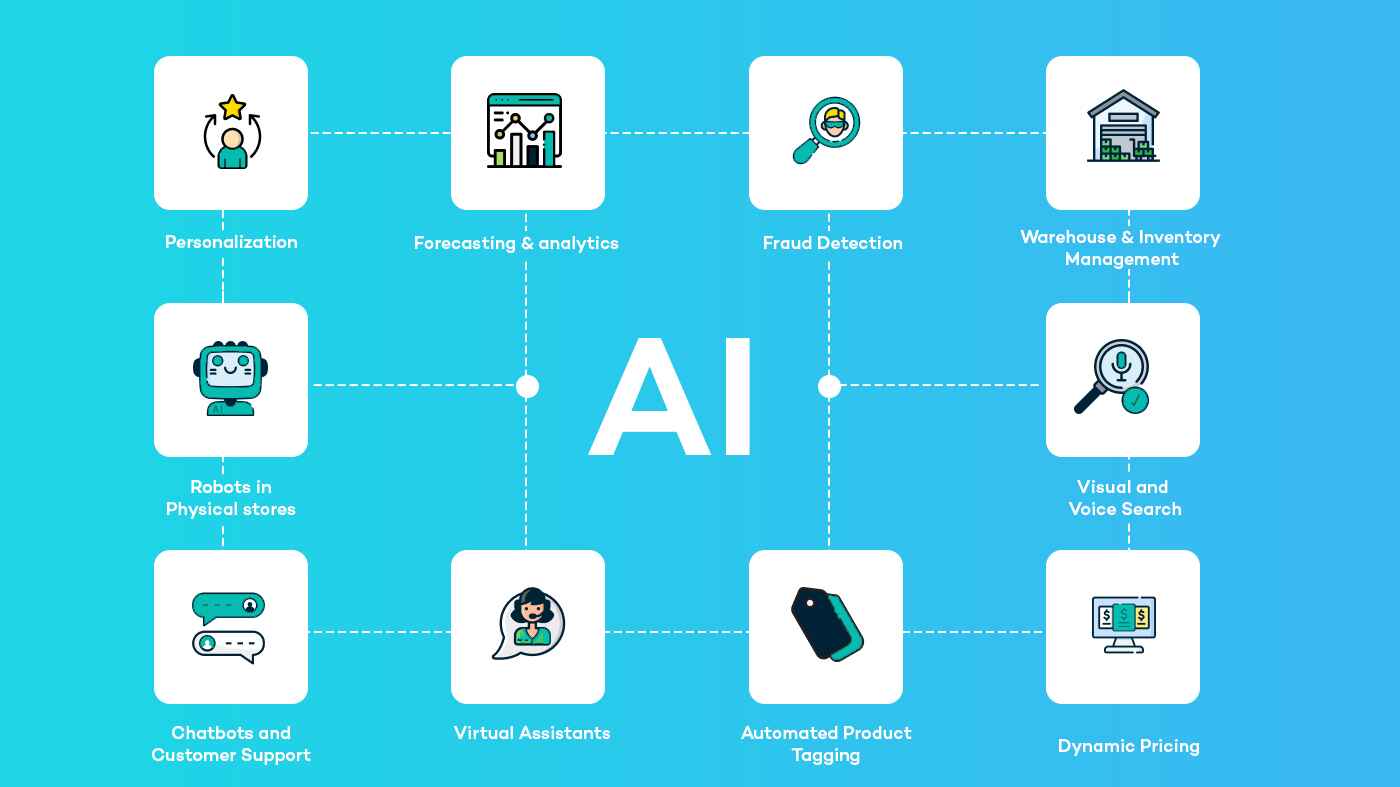
AI in eCommerce is quite versatile.
It covers everything from personalised recommendations and virtual assistants to inventory management and cybersecurity. The goal? To transform how businesses interact with customers, optimise their operations, and deliver personalised shopping experiences.
These AI tools replicate cognitive skills like
-learning,
-reasoning, and
-creativity.
They use machine learning algorithms, deep learning neural networks, and natural language processing to understand and respond to customer queries, analyse data, and make informed decisions. Not just limited to specialised tasks, an integration of AI strategy in ecommerce aims for general intelligence, applying knowledge across various domains.
A key component is language processing, which helps machines understand and interpret human language. This makes virtual assistants more effective in understanding customer questions, providing relevant answers, and assisting with shopping tasks.
Natural language processing enables AI to analyse text, extract meaning, and generate human-like responses overall improving customer interactions, optimising operations, and delivering personalised experiences. This not only boosts customer satisfaction but also drives business growth and keeps companies competitive.
2. How Does AI Improve Customer Experience in eCommerce?

AI is transforming the customer experience in ecommerce by offering personalised recommendations, virtual assistants, and advanced language models that understand and respond to customer queries. Here’s how AI strategy enhances eCommerce:
- Pattern Recognition: This AI analytics tool analyses customer behaviour, preferences, and purchase history to spot trends. This enables businesses to offer personalised product recommendations and tailored shopping experiences to their consumers.
- Virtual Assistants: AI-powered chatbots provide instant help, answering queries, guiding customers through the website, and recommending products based on preferences. These virtual assistants can handle multiple interactions at once, boosting response times and customer satisfaction. AI-powered customer service has the potential to elevate average order value (AOV) by up to 47%.
- Language Models: AI language models, powered by natural language processing, enable machines to understand and respond to customer queries naturally. This makes interacting with eCommerce platforms more intuitive and conversational.
AI integration for ecommerce isn’t just about basic personalisation. It aims to create a highly relevant and engaging shopping journey by continuously learning and adapting to customer preferences. This leads to higher customer satisfaction, loyalty, and sales.
3. How Does AI Personalise Marketing Strategies?

AI has totally revamped personalised marketing in ecommerce, thanks to big data, data science, and machine learning. Here's how AI-driven retail automation amps up marketing personalisation:
- Big Data Analysis: AI analyses vast amounts of data from customer interactions, browsing history, purchase behaviour, and demographics. This helps businesses identify patterns and preferences, creating highly targeted marketing campaigns.
- Data Science Techniques: AI uses clustering, segmentation, and predictive modelling to identify customer segments and predict future behaviour. This allows businesses to tailor marketing messages and offers to specific groups, increasing campaign effectiveness.
- Machine Learning Algorithms: AI continuously learns from customer data, delivering personalised marketing messages, offers, and content based on customer preferences and past interactions.
With AI-powered personalised marketing, businesses can deliver relevant and timely messages, boosting engagement and enhancing conversion rates. From suggesting products to crafting personalised emails and targeted ads, AI ensures your message hits home with the right audience at the right moment.
Plus, AI's got your back on the budget front too! By focusing on customers likely to convert, it trims wasted ad spend, boosting your ROI along the way.
4. What Role Does AI Analytics Play in Inventory Management?
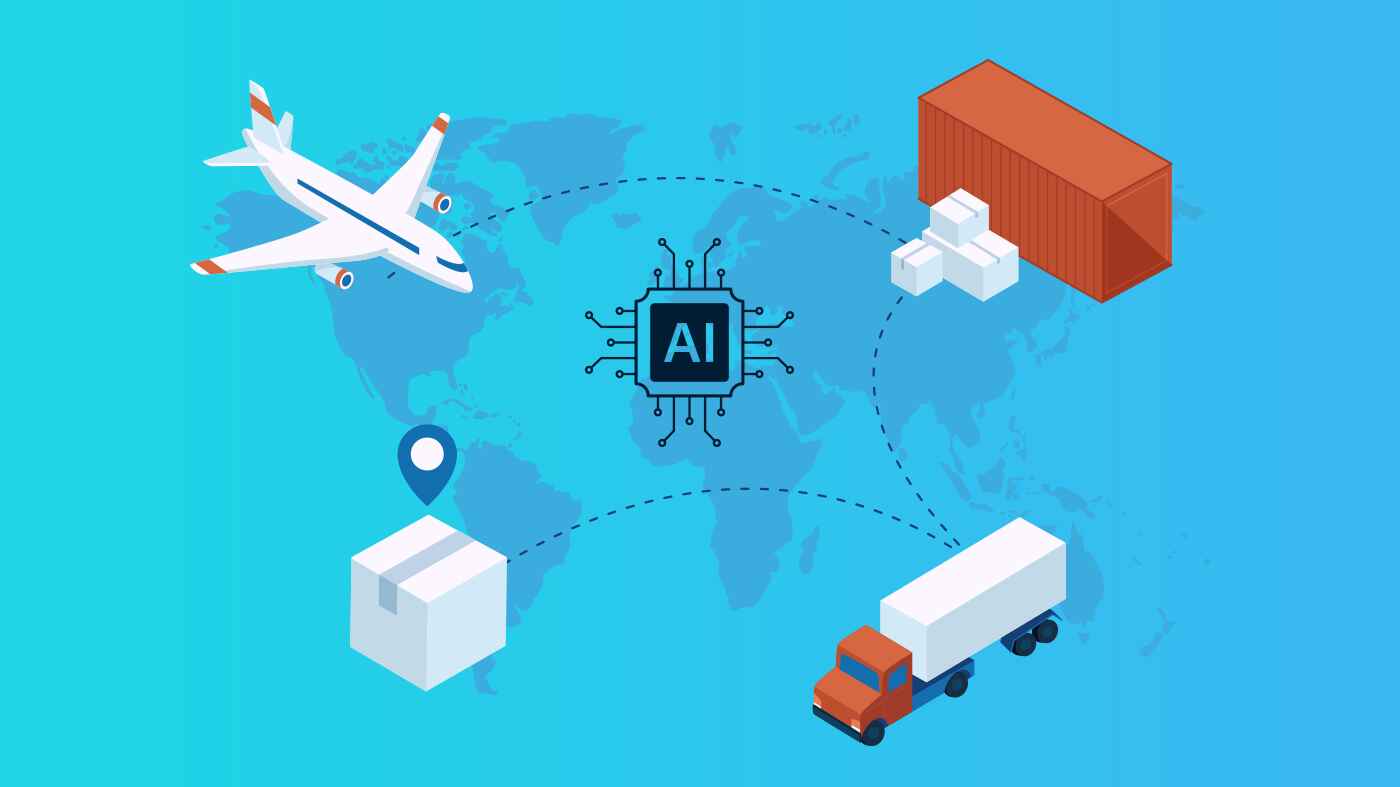
With predictive analytics, supply chain optimisation, and unsupervised learning, AI tools enable businesses to optimise inventory levels, improve demand forecasting, and streamline operations:
- Predictive Analytics: AI systems employ predictive analytics algorithms to analyse historical sales data, customer behaviour, market trends, and other relevant factors. By analysing this data, AI systems can forecast demand, enabling businesses to optimise inventory levels, reduce stockouts, and avoid overstocking.
- Supply Chain Optimisation: AI systems can optimise supply chains by analysing data from suppliers, distributors, and production facilities. By analysing real-time data, AI systems can identify bottlenecks, optimise logistics, and streamline operations, improving efficiency and reducing costs.
| By 2030, it is anticipated that more than 80% of logistics firms will incorporate AI and machine learning into their operations. |
- Unsupervised Learning: AI systems leverage unsupervised learning algorithms to identify patterns, anomalies, and trends in inventory data. By analysing data without human intervention, AI systems can detect inefficiencies, identify areas for improvement, and make data-driven recommendations to optimise inventory management processes.
AI in inventory management helps businesses balance customer satisfaction and cost-effectiveness. By optimising inventory levels, businesses ensure products are available when needed, reducing stockouts and enhancing satisfaction. This also cuts holding costs and boosts supply chain efficiency.
5. How Does AI Integration Enhance eCommerce Security?
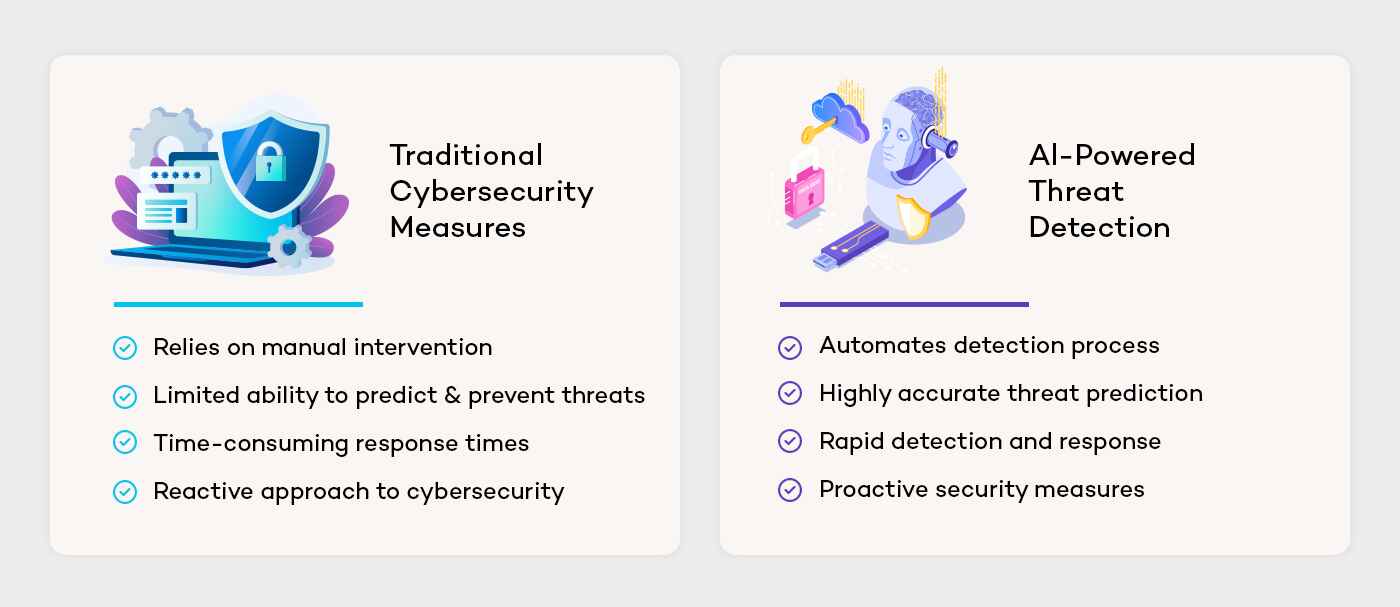
AI is revolutionising ecommerce security, enabling businesses to detect and prevent cyber threats, analyse unstructured data, and ensure the safety of customer information:
- Cybersecurity: AI systems use advanced algorithms, such as neural networks, to detect and prevent cyber threats. These algorithms analyse patterns and anomalies in network traffic, identify malicious activities, and take proactive measures to protect ecommerce platforms from cyber-attacks. In fact, the utilisation of AI to combat online fraud is on the rise, with expenditures on these technologies projected to reach $11.3 billion by 2025.
- Neural Networks: AI-powered neural networks enable machines to learn from data and recognise patterns, allowing businesses to identify and respond to security threats more effectively. Neural networks can analyse large amounts of data, including network logs, user behaviour, and system vulnerabilities, to detect potential security breaches and take immediate action.
- Unstructured Data Analysis: AI systems can analyse unstructured data, such as text, images, and videos, to identify potential security risks. By analysing unstructured data, AI systems can detect phishing attempts, identify sensitive information, and prevent data breaches, ensuring the safety and privacy of customer information.
AI-enhanced ecommerce security goes beyond traditional security measures, such as firewalls and antivirus software. AI systems can adapt and learn from new threats, continuously improving their ability to detect and prevent security breaches.
They can analyse vast amounts of data in real time, allowing businesses to respond quickly to emerging threats and protect customer data.
6. Can AI Integration In eCommerce Help with Dynamic Pricing?
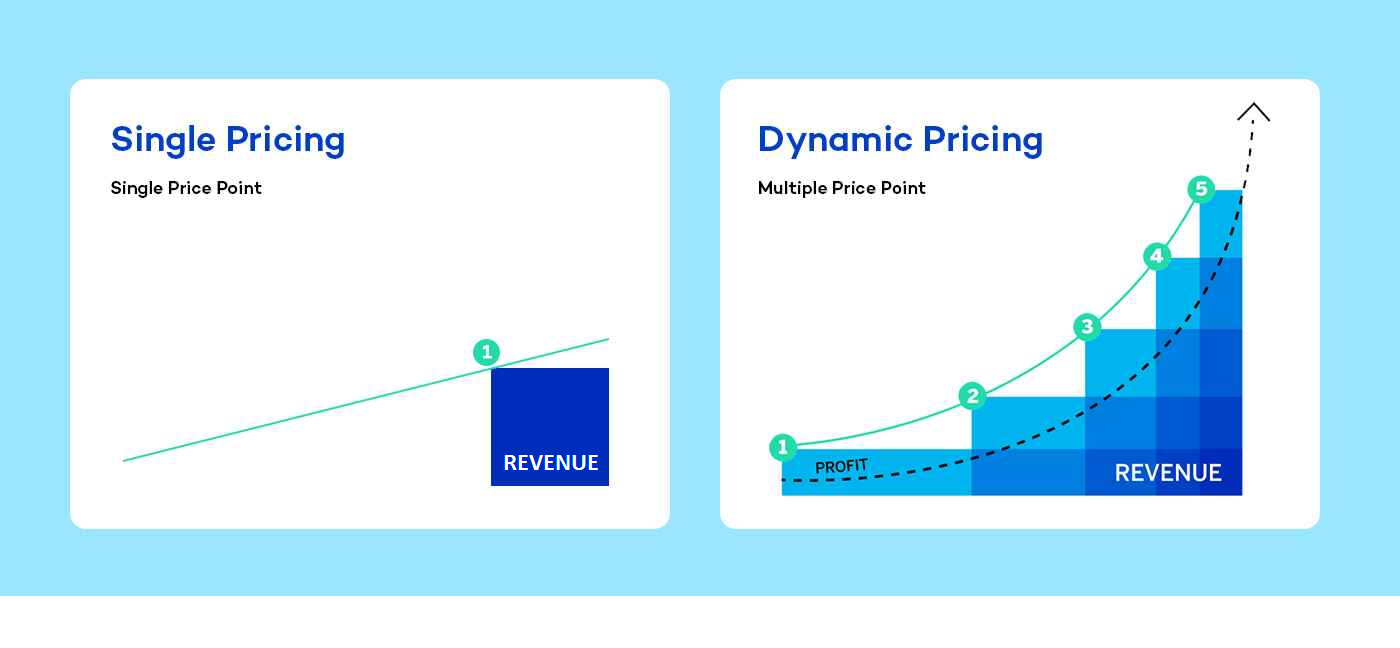
AI can help businesses optimise their pricing strategies and achieve a competitive edge with:
- Machine Learning Algorithms: AI systems employ machine learning algorithms to analyse historical sales data, customer behaviour, competitor pricing, and market trends. By analysing this data, AI systems can predict demand, identify pricing patterns, and optimise pricing strategies to maximise revenue and profitability.
- Analysing Large Amounts of Data: AI systems can analyse large amounts of data quickly and efficiently, enabling businesses to make data-driven pricing decisions. By analysing customer demographics, preferences, and purchasing history, AI systems help tailor prices to individual customers, increasing sales and customer satisfaction.
- Problem-Solving Capabilities: AI systems can solve complex pricing optimisation problems that go beyond simple rules-based pricing strategies. They can consider multiple factors, such as demand elasticity, competitor prices, and inventory levels, to determine the optimal pricing strategy that maximises revenue and profitability.
AI-driven dynamic pricing in ecommerce allows businesses to set prices real-time based on market conditions, customer behaviour, and other relevant factors. This enables businesses to respond quickly to changes in demand, optimise revenue, and gain a competitive advantage in the market.
7. How Does AI Improve Supply Chain Management?
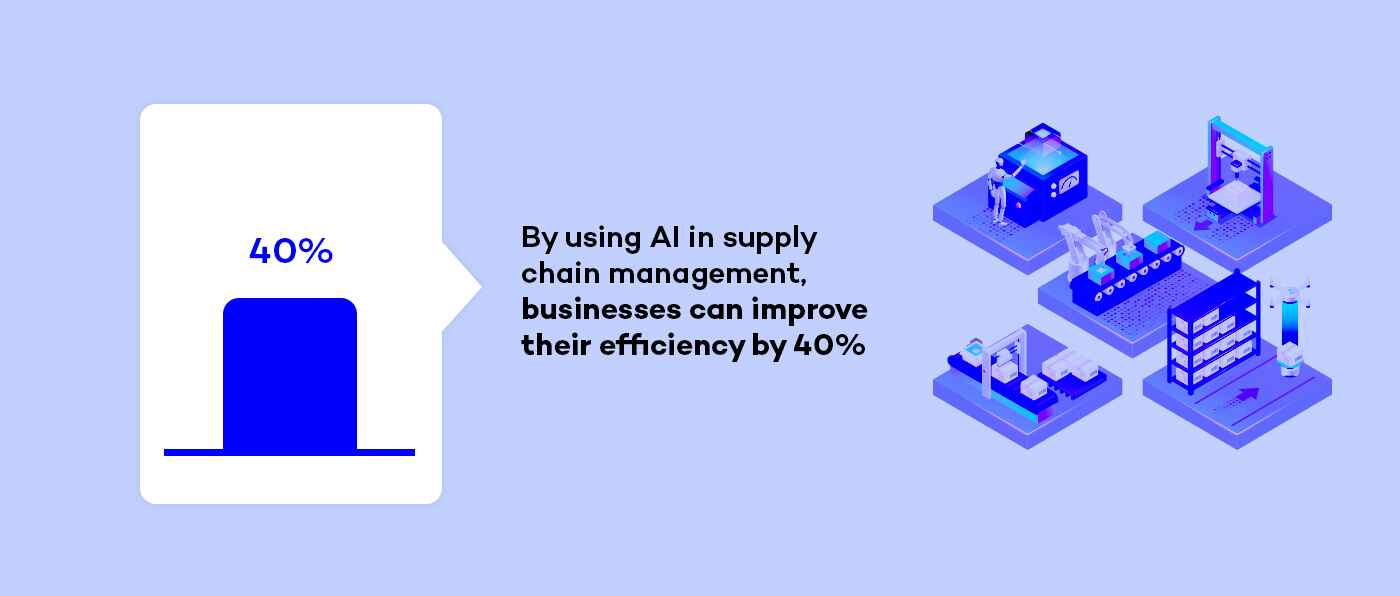
AI has transformed supply chain management in ecommerce by enabling businesses to optimise logistics, improve efficiency, and make data-driven decisions real-time:
- Optimisation: AI systems employ optimisation algorithms to streamline supply chain operations, reduce costs, and improve efficiency. These algorithms consider multiple factors, such as demand, inventory levels, transportation costs, and lead times, to optimise logistics and ensure timely delivery of products.
| In an omnichannel retail environment, AI seamlessly integrates inventory and supply chain data across all channels, maintaining consistent stock levels and meeting customer expectations. |
- AI Tech: AI tools for retail automation, such as machine learning, deep learning, and natural language processing, play a vital role in improving supply chain management. Machine learning algorithms can analyse large amounts of data, learn from patterns, and make intelligent decisions to optimise supply chain processes. Deep learning neural networks enable machines to understand and respond to complex supply chain challenges.
8. How Does AI Aid in Analysing Customer Feedback?
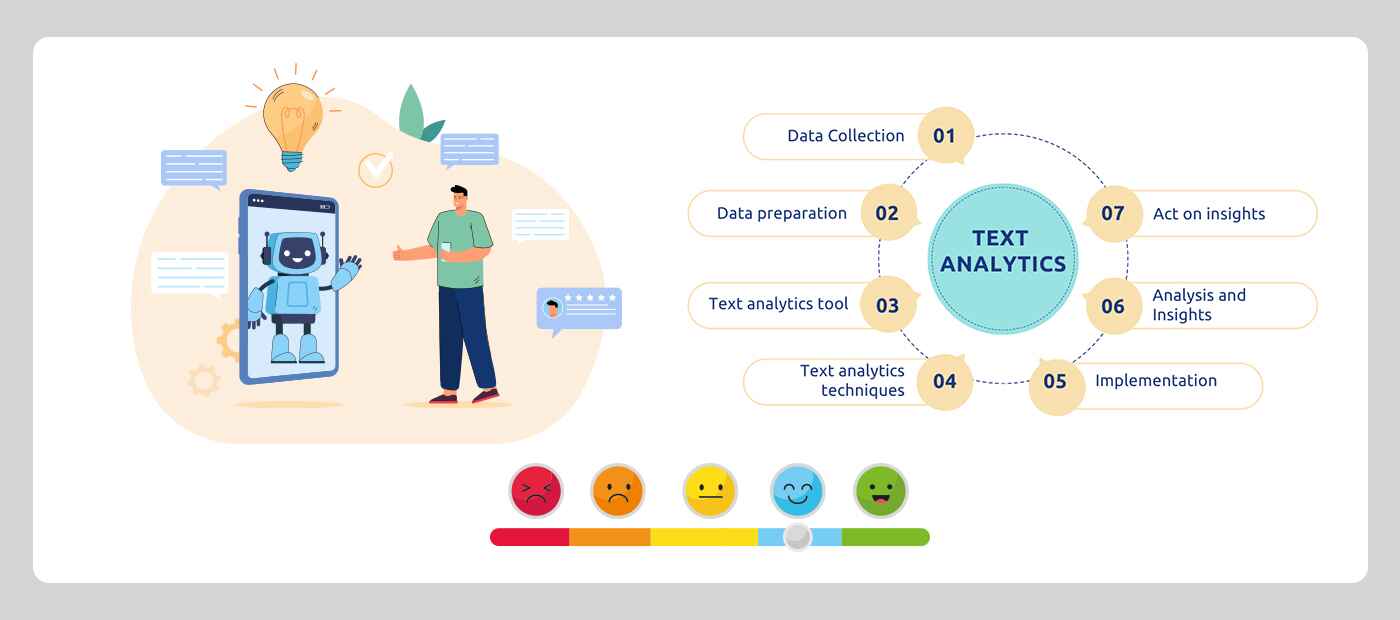
| 76% of consumers say they’re more likely to purchase from brands that invest in personalisation. |
By making the most of sentiment analysis, text analytics, and feedback loops, AI enables businesses to gain valuable insights from customer feedback, make data-driven decisions, and continuously improve their products and services.
Want to know how? Here you go:
- Sentiment Analysis: AI-powered sentiment analysis techniques enable businesses to analyse customer feedback, reviews, and social media posts to understand customer sentiments and emotions. By analysing sentiment, businesses can identify areas of strength and areas for improvement, allowing them to make data-driven decisions to enhance customer satisfaction.
- Text Analytics: AI systems employ text analytics techniques to analyse customer feedback at scale. Text analytics allows businesses to extract insights from unstructured data, such as customer reviews, emails, and social media posts. By analysing these textual data sources, businesses can identify trends, patterns, and emerging issues, enabling them to take proactive measures to address customer concerns.
- Feedback Loop: AI facilitates a feedback loop between businesses and customers. By continuously monitoring and analysing customer feedback, businesses can make targeted improvements to their products, services, and customer experiences. This feedback loop ensures that businesses are responsive to customer needs, preferences, and concerns, enhancing customer satisfaction and loyalty.
End Note
In a world where data and technology reign supreme, AI is the knight in shining armour for ecommerce. From revolutionising customer experiences to customer experiences enhancing security and supply chain management, AI wears many hats in the digital marketplace. Looking ahead, the future trends of AI in ecommerce promise even more innovation and efficiency, from personalised shopping experiences and predictive analytics to advanced fraud detection and automated inventory management. Whether you're a retailer or a shopper, the future of ecommerce with AI is bright, exciting, and full of possibilities.
Stick around for more insights and answers to your burning questions about this digital wizardry. After all, when it comes to AI, the future is now!
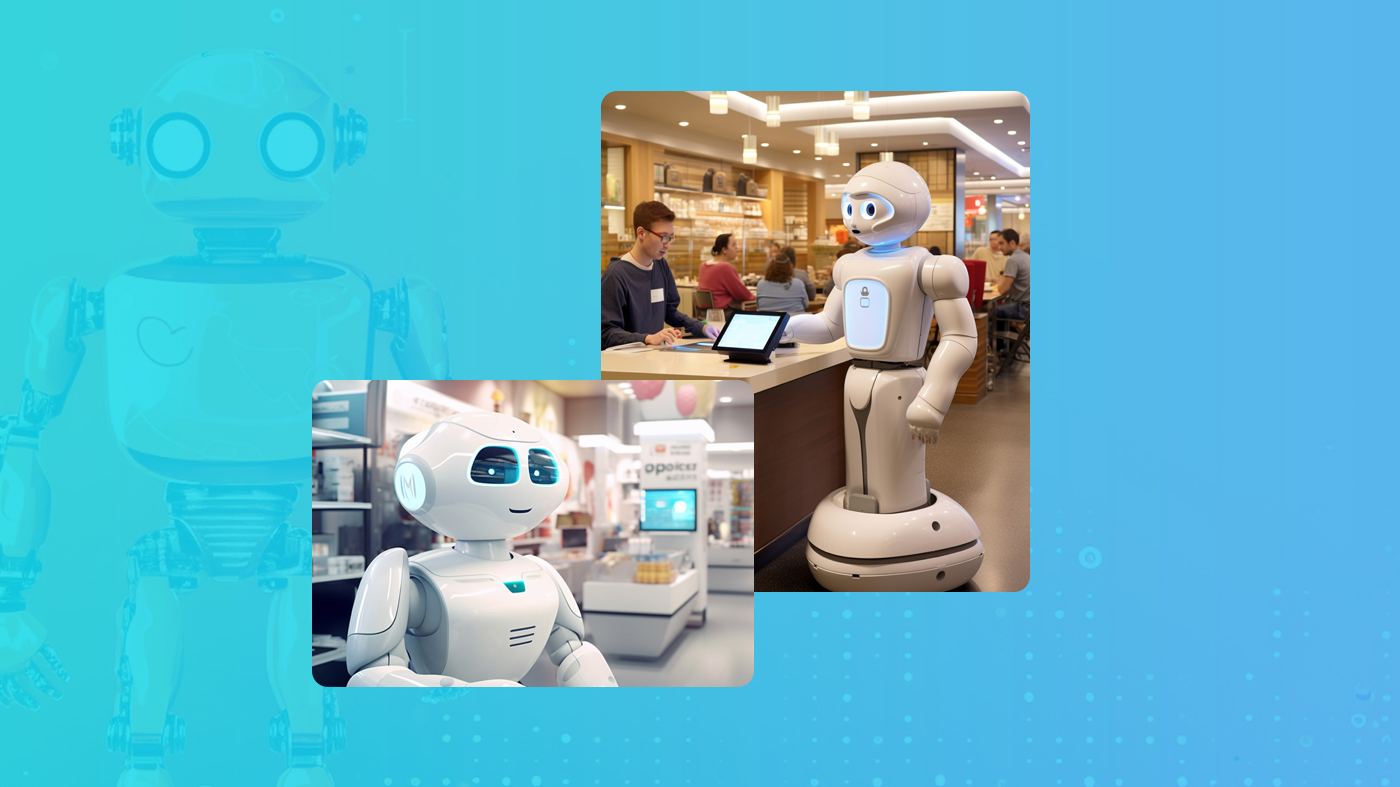












































































.jpg?w=3840&q=75)


.png?w=3840&q=75)











.jpg?w=3840&q=75)

